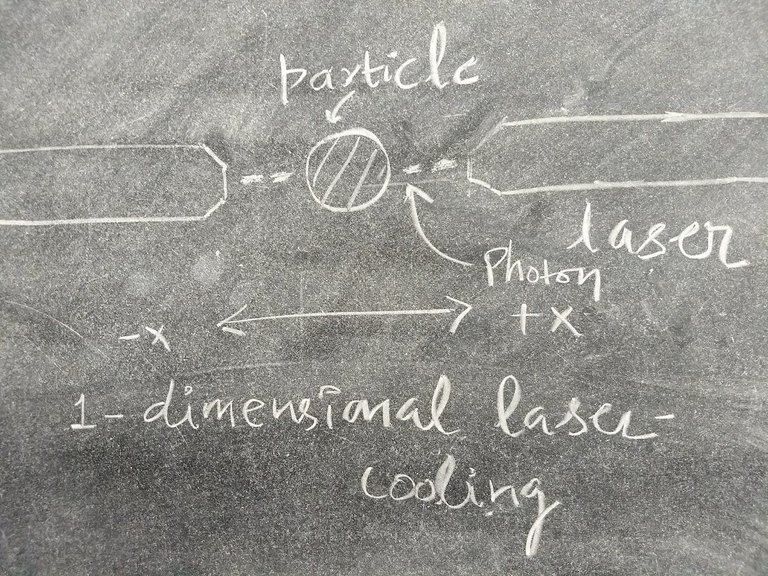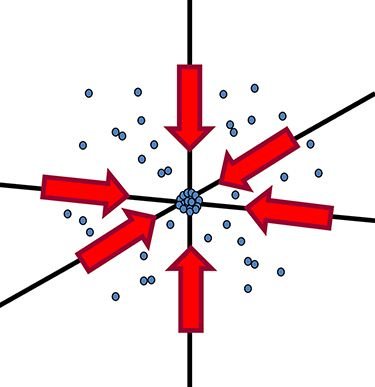When I was young, first time I saw a working laser in a movie. An actor cuts a bank locker with a laser gun. I learned that laser is hot and it cuts by burning the material. Later, I learned that laser is used in many other things _e.g._surgery, CD players etc.
In this article, we will discuss one more use of the laser: the laser cooling, a technique which uses a laser to cool the microscopic chunk of material to nanokelvin scale.
What Is Laser Cooling?
Many people hold the conception that laser can only make things hotter, but in fact, it is also being used to cool down the molecules now.
Laser cooling is a technique that uses lasers to cool the microscopic chunk of material to micro (10^-6 K) to nanokelvin (10^-9 K) scale.
Principle Of Laser Cooling:
To understand laser cooling, we have to understand two things, quantum nature of light and cooling.
Cooling a substance means the thermal motion or the kinetic energy of the constituent particles is gone down. The particles which were jittering rapidly are slow now. Also, I want to remind you that light travels in small packets called quanta of light.
At first glance, it seems that by using a laser, one will be adding kinetic energy instead of decreasing it, which is counter-intuitive for a cooling process to occur, but indeed the opposite happens.
Photon has zero rest mass, but when in motion, it carries finite mass and momentum. This momentum can be used against the momentum of the particles doing the thermal motion.
First, we constraint our system to 1-dimension for simplicity. Let's consider a particle which is performing the thermal motion in 1-d in either +x or -x-direction (Figure 1).

Figure 1: Laser cooling schematic in 1-dimension. The shaded circle represents the particle which is getting cooled and laser sources are shown on the left and right side of the particle. Also, there are photons coming out of laser source that will hit the particle and there will be a loss of momentum and hence the particle will be cooled. Ref[I drew it]
When a particle is moving in the +x-direction, the laser emits a photon which slows it down in that direction and the same happens when it goes in -x-direction, the photons from the laser slows the particle down in -x-direction.
But in reality, we have 3-spatial dimensions, thus we have to use 6 lasers (Figure 2) or the combination of lasers and mirrors to slow it down in all the 6 directions.
Also, the Doppler shift is needed to be done because when the particle is coming toward or away from the laser source, the frequency, it percieves increases slightly. This is also needed to be accounted for.

Figure 2: Schematic for laser cooling in 3-dimensions. Here, six lasers are being used, but mostly the combination of mirrors and lasers is used. Ref[1]
Why Do We Need Such Low Temperatures?
At non-zero temperatures, there are large effects of thermal motion and the quantum effects of the particle are obscured. If the temperature is near absolute zero, quantum effects can be observed. In this ultracold state of matter, quantum effect such as Bose-Einstein condensate can be observed.
There are a lot of technical details of the experimental setup that I did not go through, as that is beyond the scope of this article. This article gives you the feeling that how this method works. Also, there are other methods to go to near absolute zero such as sideband cooling and use of Zeeman slower etc.
Another counter intuitive phenomenon! Thank you for writing this. @treslotos
Thank you @dexterdev for taking time to read it. :)
Congratulations @treslotos! You received a personal award!
Click here to view your Board
Do not miss the last post from @steemitboard:
Congratulations @treslotos! You received a personal award!
You can view your badges on your Steem Board and compare to others on the Steem Ranking
Vote for @Steemitboard as a witness to get one more award and increased upvotes!